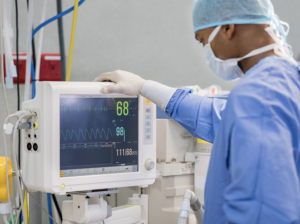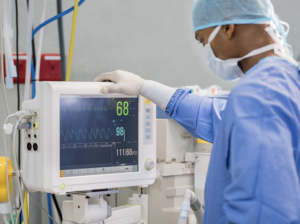Low and middle-income countries (LMICs) rarely manufacture their own medical devices but heavily rely on importing up to 95% of these products. LMICs rarely have the expertise to advise on procurement of medical devices suited for their resource-constrained settings coupled with the fact that medical device manufacturers are located in and accustomed to high-income countries.
In addition to equipment that is often too expensive for LMICs, there are also challenges associated with procuring suitable devices to minimize recurring costs, operational expenses, or additional accessories and consumables. It is estimated that 40 to 70% of medical devices and equipment in LMICs are broken, unused, or unfit for purpose mainly due to indiscriminate procurement practices, including inadequate planning for lifecycle costs (total cost of ownership).
For medical products, the total cost of ownership (TCO) considers the cost to purchase, install, operate, maintain, and dispose of medical equipment for its lifetime. It is estimated that most procurement decisions for medical devices are based on the initial purchase cost, which is only 20% of the total cost of owning medical equipment for its lifetime. The other 80% of the costs are mostly hidden. In healthcare, the TCO concept is rarely used during decision-making, and the process is not standardized. Therefore, our objective is to develop a simple TCO tool to guide the purchasing decisions of medical devices in West Africa and potentially other regions.
Through desk research and interviews with key stakeholders involved in medical device procurement in West Africa, we mapped the process of product purchasing in the region to identify the considerations and challenges, particularly concerning TCO. Ultimately, we aimed to develop a decision-making tool that addresses their challenges with incorporating TCO.
Our findings suggest that the challenges with medical device procurement related to a lower consideration for the TCO include budget constraints, lack of established guidelines and standards, and a low level of expertise in this regard.
We developed a preliminary decision support tool for TCO considerations for medical device purchasing in Africa through expert insights and desk research. Although this tool is still in development and requires further testing and validation to be fully operational, it is intended to address gaps in previous tools and help plan medical device procurement in West Africa, with potential application across the African continent. This tool is designed to be simple, widely applicable across different geographies and device categories rather than provide actual costs or quantitative information, which are so variable, to encourage prospective buyers to consider factors other than upfront cost when making a purchasing decision.
ADVISORS AND COLLABORATORS: Brinnon Mandel, Vice President, Strategic Partnership, VIA Global Health; Noah Perin, CEO & Co-founder, VIA Global Health
E4C 2021 PROGRAM MANAGEMENT TEAM: Mariela Machado, Senior Program Manager; Grace Burleson, Research Manager; Marilynn Holguín Clover, Program Coordinator; Jonathan Kemp, Program Associate
This research was completed as part of the 2021 E4C Fellowship program. Learn more about the Fellows who worked on this research collaboration by connecting with them on LinkedIn: Miracle Ndego and Khaoula Trigui.


No Comments.